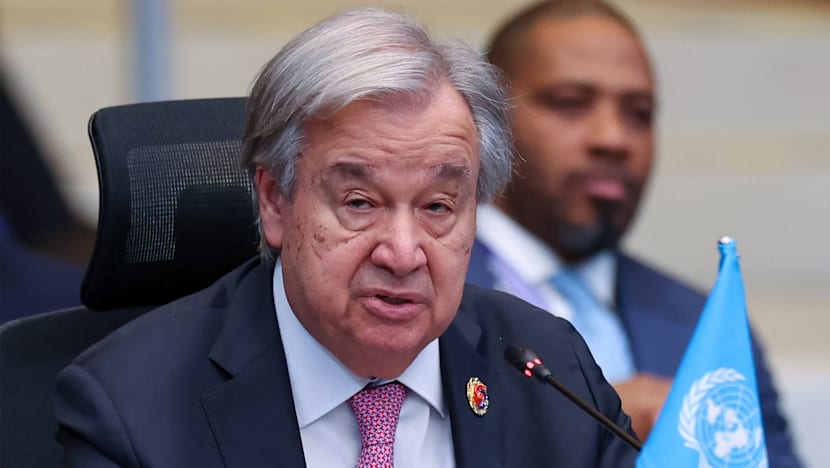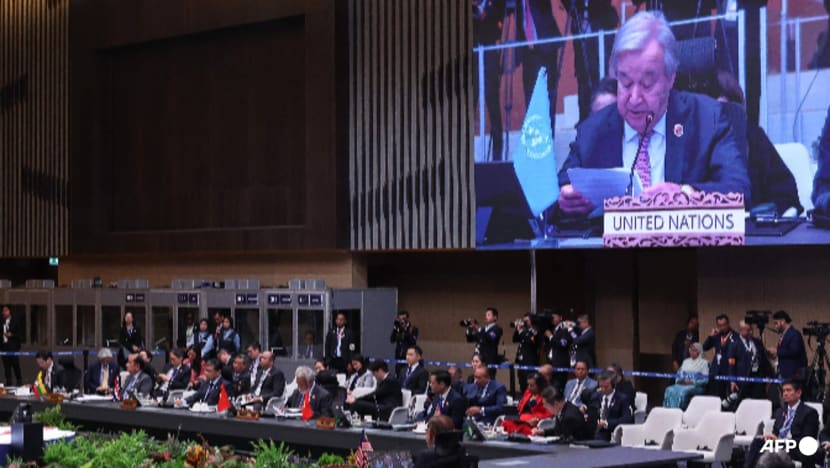UN Security Council 'paralysed' by divisions among superpowers, says Guterres at ASEAN Summit
Secretary-General Antonio Guterres discusses the United Nations' relevance amid various conflicts across the world in a wide-ranging interview with CNA's Correspondent Afifah Ariffin.

United Nations Secretary-General Antonio Guterres speaks during the 15th ASEAN-UN Summit at the 47th Association of Southeast Asian Nations Summit in Kuala Lumpur, Malaysia, Oct 27, 2025. (Photo: AFP/Chalinee Thirasupa/Pool)

This audio is generated by an AI tool.
KUALA LUMPUR: The United Nations Security Council, whose members often hold conflicting views, has become “ineffective” in addressing many of the world’s crises, said Secretary-General Antonio Guterres.
Reiterating his call for reform, the UN chief said the council’s five permanent members have used their veto powers to serve their own interests, which has eroded the global intergovernmental organisation’s credibility.
He said the core challenge lies in the deep rifts among the world powers that make up the UN’s primary body for maintaining international peace and security.
“It is true that the Security Council is largely paralysed in relation to key issues … and the reason is divisions among superpowers,” he said.
“People should call a spade a spade and attribute responsibilities to (them).”
The five permanent members are China, France, Russia, the United Kingdom and the United States – any of them can block any resolution. There are also 10 members elected on a regional basis every two years but they have limited privileges. Guterres described this structure as outdated and unrepresentative of the modern world.
“We need to reform the Security Council. (It has) three European permanent members, one Asian … no African, no Latin American. The composition needs to change and to adapt to what is today's reality,” he said.
The UN chief was speaking to CNA on the sidelines of the Association of Southeast Asian Nations (ASEAN) Summit in Kuala Lumpur on Monday (Oct 27), where conflicts in Myanmar, Gaza and the South China Sea were among the topics discussed.
MYANMAR CRISIS
At the summit, ASEAN leaders renewed calls for Myanmar’s military junta to end the bloodshed and make progress on the Five-Point Consensus, a peace plan that includes facilitating dialogue among conflicting parties and allowing aid to reach those affected.
Large parts of Myanmar have been deprived of humanitarian aid through the more than four-year-long civil war, as access restrictions imposed by the junta have prevented relief agencies from reaching communities in need of food, medical supplies and other essential assistance.
Guterres said humanitarian assistance alone cannot resolve Myanmar’s crisis.
“Humanitarian aid is not the solution for the Myanmar people,” he said.
“The solution for Myanmar's people is peace, which means the end of conflict, through reconciliation, the liberation of political prisoners, and the creation of conditions to return to a democratic form of government.”
The junta is set to hold a general election on Dec 28 – the nation’s first since the 2021 coup – but concerns over fairness, inclusivity and credibility remain.
The military-backed administration has invited ASEAN states to send observers to the polls, but sources said there was no consensus among the grouping to send monitors.

In a statement released on Sunday, the bloc said that the cessation of violence and inclusive political dialogue must precede elections.
The European Union had earlier said it would not send observers, dismissing the vote as neither free nor fair, in a blow to the junta’s hopes of legitimising the polls.
“In the present situation of conflict and taking into account the records of human rights of the military junta, it is obvious that the conditions for fair elections are not there,” said Guterres.
“(In fact), elections might be part of the problem instead of being part of the solution.”
SOUTH CHINA SEA TENSIONS
ASEAN is also pushing to finalise a long-delayed code of conduct for the South China Sea, as tensions continue among the claimant states.
China claims nearly the entire South China Sea, a position that overlaps with four Southeast Asian neighbours – Malaysia, Brunei, the Philippines and Vietnam. Unresolved disputes over the ownership of islands and maritime features have persisted for decades.
Guterres commended ASEAN's efforts to accelerate negotiations on the code, saying he hopes dialogue prevails.
“We are very much in favour of avoiding any kind of incidents. We're very much in favour of free navigation. We are very much in favour of the observation of the norms defined by the UN Convention of the Law of the Sea,” he said.
GAZA CEASEFIRE
On the ceasefire in Gaza, Guterres called the Oct 10 truce an “extraordinarily positive achievement” after two years of gruelling war.
Despite its fragility, he said the deal is a lifeline that allows desperately needed humanitarian aid to flow into the war-torn enclave.
“The suffering of the people in Gaza (has been) absolutely horrendous. To stop the war was in itself an extremely positive thing. We need to make sure that the ceasefire is maintained and that everybody abides by the first phase of the agreement,” he added.
“And then, prepare for the second phase that we hope will lead to the recognition of the rights of the Palestinian people to self-determination and statehood.”
















